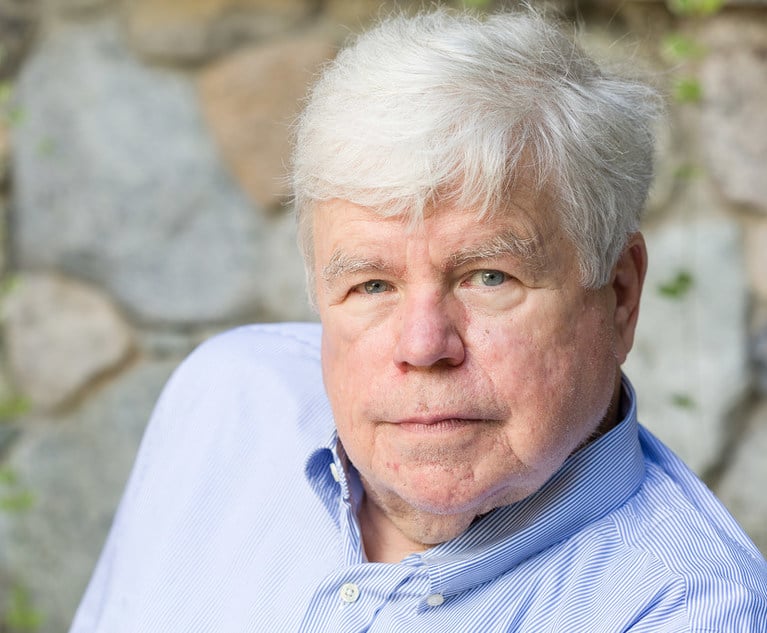The Constitution and the 'Right to Privacy'
In overruling 'Roe' and 'Casey', the new majority in the Supreme Court holds that there is no Constitutional "right to privacy."
July 13, 2022 at 10:00 AM
10 minute read
 During a 2006 debate with the President of the ACLU, Justice Antonin Scalia argued that unelected judges on the Supreme Court have no business deciding cases based on public morality or public policy—those decisions, he said, should be left to lawmakers or the public. As for "pro-abortion judges," Scalia warned: "Someday, you're going to get a very conservative Supreme Court and regret that approach." Once again Justice Scalia has been proven prescient.
During a 2006 debate with the President of the ACLU, Justice Antonin Scalia argued that unelected judges on the Supreme Court have no business deciding cases based on public morality or public policy—those decisions, he said, should be left to lawmakers or the public. As for "pro-abortion judges," Scalia warned: "Someday, you're going to get a very conservative Supreme Court and regret that approach." Once again Justice Scalia has been proven prescient.
If the Supreme Court's decision in Dobbs v. Mississippi had expressed agreement with Justice Rehnquist's 1,500 word dissent in Roe v. Wade, or simply put us back to pre-Roe days, the laws relating to a woman's "right to choose" would have been manageable; however, the Dobbs decision written by Justice Alito not only overrules Roe and the consequent Planned Parenthood v. Casey, it does so in a 98-page "in your face" denigration of physicians whom he calls "abortionists" and those health care professionals who claim a paramount interest in a woman's health. Dobbs also establishes the basis for overruling important decisions which protect some rights we all have come to consider as fundamental to our notion of liberty and freedom.
In Dobbs, the Supreme Court holds that Roe was "egregiously wrong" and that the right sought to be protected (abortion) is not in the text of the Constitution nor "rooted in the Nation's History and Tradition." But Justice Alito's "history" pays little attention to the fact that early stage abortions, those performed before the "quickening" of the fetus, were condoned and routinely practiced by midwives and others using herbs and other abortifacients as far back as the time of Hippocrates. In fact, during the 18th century, Benjamin Franklin edited a book which listed with approvals best-known herbal abortifacients of the 18th century, herbs which would have been given to women to end an early pregnancy. But whether a woman's right to abortion is "deeply rooted in history" or simply an innovation created by Roe, does not really matter to the Dobbs court which ultimately decided that to have an abortion—whether in late term or at the moment of conception—is not a part of a woman's privacy or liberty rights
This content has been archived. It is available through our partners, LexisNexis® and Bloomberg Law.
To view this content, please continue to their sites.
Not a Lexis Subscriber?
Subscribe Now
Not a Bloomberg Law Subscriber?
Subscribe Now
NOT FOR REPRINT
© 2024 ALM Global, LLC, All Rights Reserved. Request academic re-use from www.copyright.com. All other uses, submit a request to [email protected]. For more information visit Asset & Logo Licensing.
You Might Like
View All

Trade Secret Litigation: How Will AI Innovations Likely Be Litigated?

Standing on Less Shaky Ground: 'Guthrie' Decision Impact on NY Wage and Hour Matters
7 minute readTrending Stories
- 1Senators Grill Visa, Mastercard Execs on Alleged Anti-Competitive Practices, Fees
- 2Deal Watch: Gibson Dunn, V&E, Kirkland Lead Big Energy Deals in Another Strong Week in Transactions
- 3Advisory Opinion Offers 'Road Map' for Judges Defending Against Campaign Attacks
- 4Commencement of Child Victims Act at Heart of Federal Question Posed to NY's Top Court
- 5Bolstering Southern California Presence, Sidley Austin Settles Into Revitalized Downtown LA Office
Who Got The Work
Michael G. Bongiorno, Andrew Scott Dulberg and Elizabeth E. Driscoll from Wilmer Cutler Pickering Hale and Dorr have stepped in to represent Symbotic Inc., an A.I.-enabled technology platform that focuses on increasing supply chain efficiency, and other defendants in a pending shareholder derivative lawsuit. The case, filed Oct. 2 in Massachusetts District Court by the Brown Law Firm on behalf of Stephen Austen, accuses certain officers and directors of misleading investors in regard to Symbotic's potential for margin growth by failing to disclose that the company was not equipped to timely deploy its systems or manage expenses through project delays. The case, assigned to U.S. District Judge Nathaniel M. Gorton, is 1:24-cv-12522, Austen v. Cohen et al.
Who Got The Work
Edmund Polubinski and Marie Killmond of Davis Polk & Wardwell have entered appearances for data platform software development company MongoDB and other defendants in a pending shareholder derivative lawsuit. The action, filed Oct. 7 in New York Southern District Court by the Brown Law Firm, accuses the company's directors and/or officers of falsely expressing confidence in the company’s restructuring of its sales incentive plan and downplaying the severity of decreases in its upfront commitments. The case is 1:24-cv-07594, Roy v. Ittycheria et al.
Who Got The Work
Amy O. Bruchs and Kurt F. Ellison of Michael Best & Friedrich have entered appearances for Epic Systems Corp. in a pending employment discrimination lawsuit. The suit was filed Sept. 7 in Wisconsin Western District Court by Levine Eisberner LLC and Siri & Glimstad on behalf of a project manager who claims that he was wrongfully terminated after applying for a religious exemption to the defendant's COVID-19 vaccine mandate. The case, assigned to U.S. Magistrate Judge Anita Marie Boor, is 3:24-cv-00630, Secker, Nathan v. Epic Systems Corporation.
Who Got The Work
David X. Sullivan, Thomas J. Finn and Gregory A. Hall from McCarter & English have entered appearances for Sunrun Installation Services in a pending civil rights lawsuit. The complaint was filed Sept. 4 in Connecticut District Court by attorney Robert M. Berke on behalf of former employee George Edward Steins, who was arrested and charged with employing an unregistered home improvement salesperson. The complaint alleges that had Sunrun informed the Connecticut Department of Consumer Protection that the plaintiff's employment had ended in 2017 and that he no longer held Sunrun's home improvement contractor license, he would not have been hit with charges, which were dismissed in May 2024. The case, assigned to U.S. District Judge Jeffrey A. Meyer, is 3:24-cv-01423, Steins v. Sunrun, Inc. et al.
Who Got The Work
Greenberg Traurig shareholder Joshua L. Raskin has entered an appearance for boohoo.com UK Ltd. in a pending patent infringement lawsuit. The suit, filed Sept. 3 in Texas Eastern District Court by Rozier Hardt McDonough on behalf of Alto Dynamics, asserts five patents related to an online shopping platform. The case, assigned to U.S. District Judge Rodney Gilstrap, is 2:24-cv-00719, Alto Dynamics, LLC v. boohoo.com UK Limited.
Featured Firms
Law Offices of Gary Martin Hays & Associates, P.C.
(470) 294-1674
Law Offices of Mark E. Salomone
(857) 444-6468
Smith & Hassler
(713) 739-1250







